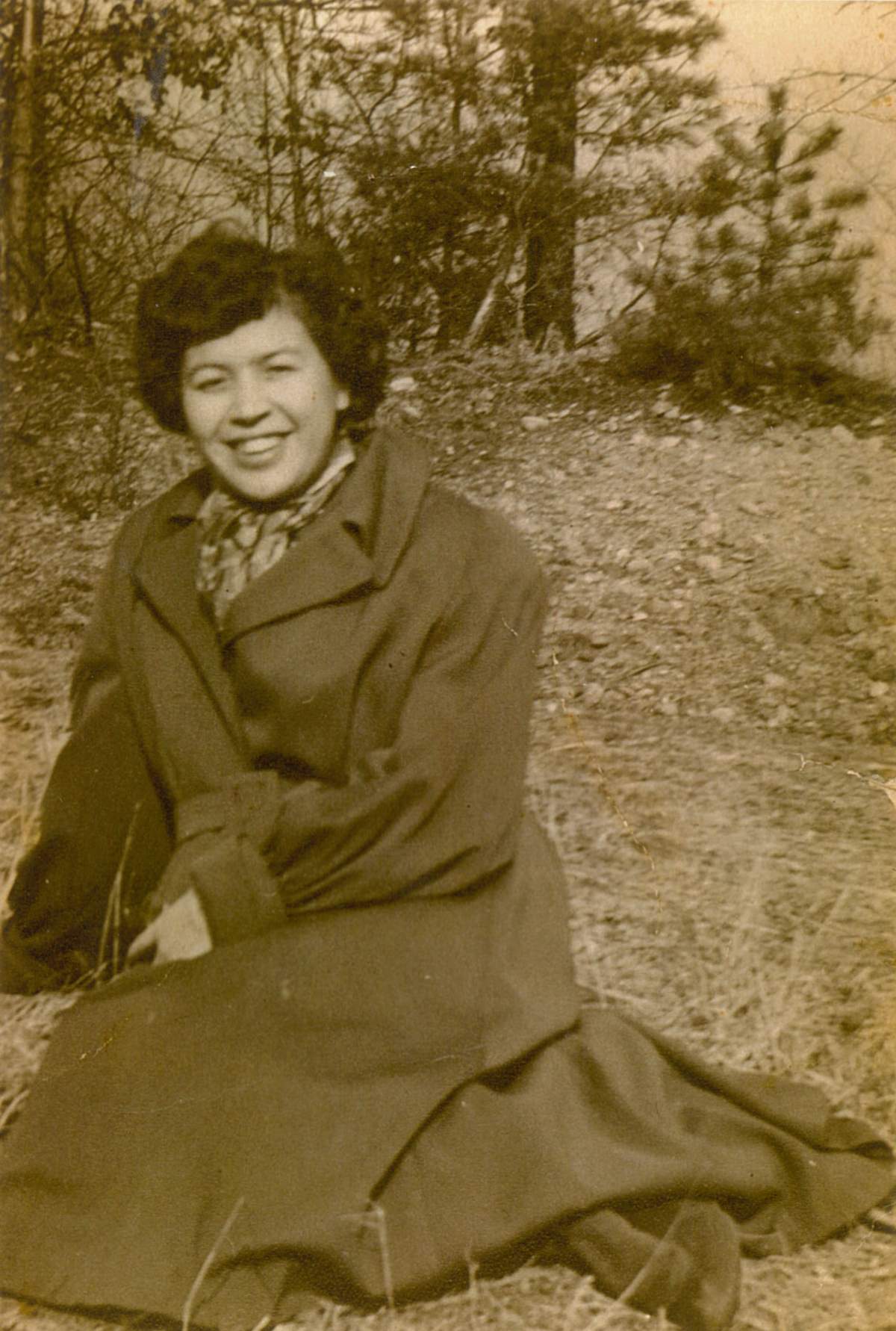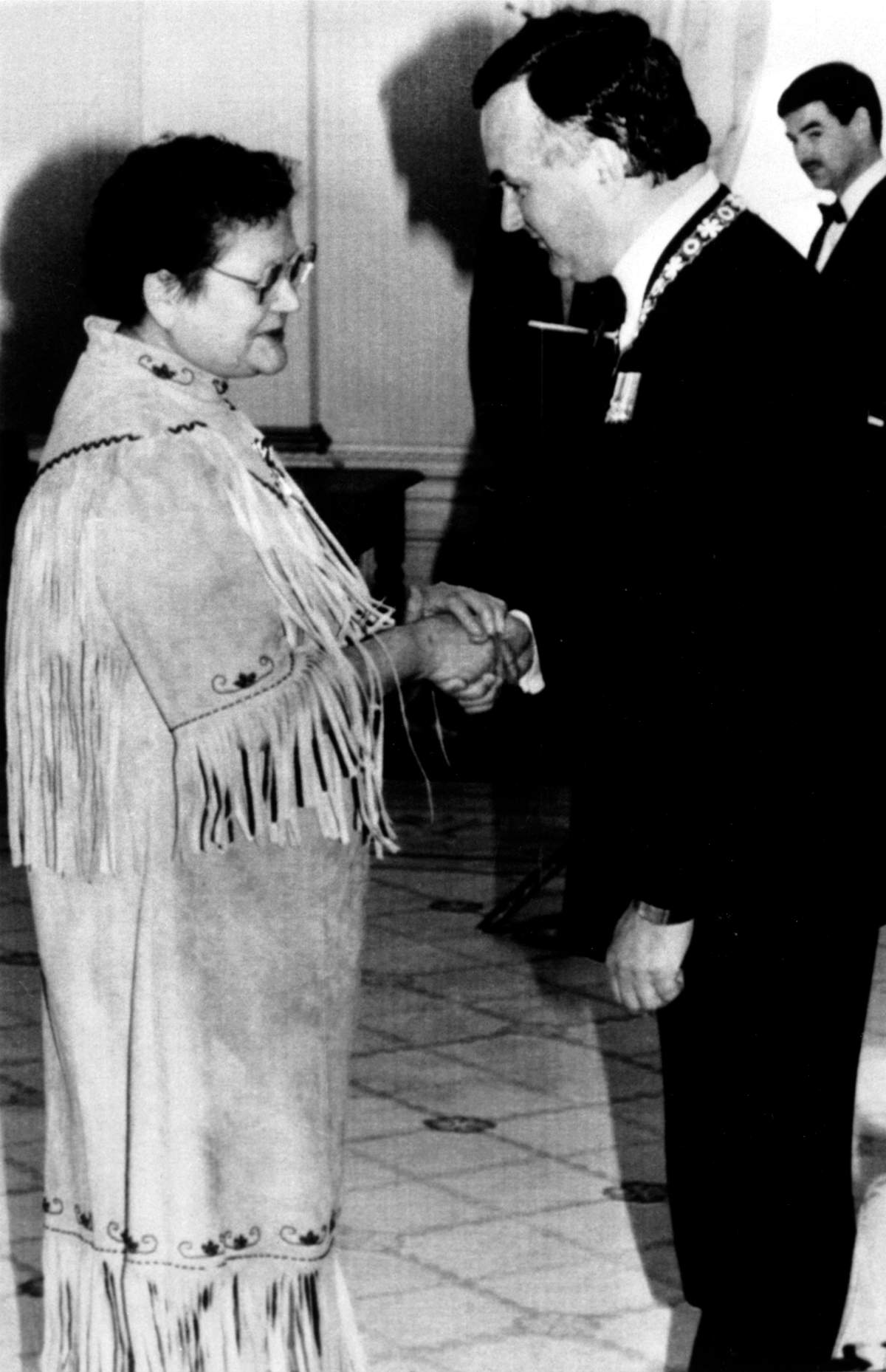I lost my talk
The talk you took away.
When I was a little girl
At Shubenacadie school.

Like so many writers, Rita Joe poured her heart into her work. With each poem, each line, she made herself vulnerable; exposing her pain in hopes that people would understand her better. It’s what earned her the name “Gentle Warrior”.
Joe was a Mi’kmaq woman from Cape Breton and used her writing to teach others about her culture and people. Years after her death, her words are still fighting.
A newly commissioned show at Ottawa’s National Arts Centre has taken one of Joe’s poems and re-imagined it as a visual experience.
Her most poignant piece of work, I Lost My Talk, published in 1978, recounts her years at a residential school in Halifax.
“She says, ‘I lost my talk, the talk you took away,’ it’s like her power was taken away from her, but she’s trying to get it back,” Joe’s youngest daughter, Ann Joe, said.
Rita Joe went to Shubenacadie Indian Residential School in Halifax in 1944, at the age of 12.
“She used to say ‘It was like a castle,’” Ann Joe said. “She said ‘when I got there, it just turned to dust. It wasn’t like I thought it was going to be.’”
When Joe left the residential school, four years later, she no longer remembered the Mi’kmaq language.
“And when she got out, she would try to talk to other Mi’kmaq people, and she would ask them to teach her,” Ann Joe said.
For over a century, indigenous children across Canada were separated from their families and sent to residential schools. The religious-based schools were designed to assimilate the children, taking away their culture and language.

Get breaking National news
Many students faced horrendous abuse, neglect and systemic discrimination. Canada only formally apologized for the system in 2008.
You snatched it away:
I speak like you
I think like you
I create like you
The scrambled ballad, about my word.
Rita Joe started writing in the 1970s, plucking away on her typewriter.
“And I used to find it so calming, that sound,” Ann Joe remembered. “It was like every couple years she did a new book, and it was like each book, she was getting more and more well known.”
Her poem I Lost My Talk was her plea to others to understand who she was, who her people were.
“She’s taking a stand. And in the beginning, she’s mad. And then she’s like standing up for herself,” Ann said.
Two ways I talk
Both ways I say,
Your way is more powerful.
“And she wanted to share her love for her culture, her love for nature. She wanted to show people this is how native people are, that we’re not savages. That’s how she started writing,” Ann said.
Rita Joe would publish seven books in total.
She was awarded the Order of Canada, appointed to the Queen’s Privy Council and has been called the Mi’kmaq poet laureate. Her poem I Lost My Talk was also included in Canada’s final Truth and Reconciliation Report, addressing the legacy of the residential school system.
Photo: Micmac poet Rita Joe is invested into the Order of Canada by Governor General Ray Hnatyshyn, in a cermony at Rideau Hall. Credit: The Canadian Press
But her most defining feature was compassion and forgiveness, asking those who hurt her to get to know her. That is why she is called the Gentle Warrior.
So gently I offer my hand and ask,
Let me find my talk
So I can teach you about me.
“It’s like she put herself out on a limb,” Ann Joe said. “Nobody else was doing that, like no other – there was no other native person. No other Mi’kmaq person that was like writing and putting themselves out there like that.”
‘I Lost my Talk’ at Ottawa’s National Arts Centre takes centre stage
Now, an artistic experience to match the uniqueness and strength of Joe’s poem has made its debut in Canada.
“When I first heard I Lost My Talk, I thought how powerful this is, how simple it is, how encouraging it is because it was very free of bitterness,” former prime minister Joe Clark, an honorary witness to the Truth and Reconciliation Commission, said.
WATCH BELOW: An excerpt of the National Arts Centre performance I Lost My Talk

In January, the National Arts Centre (NAC) in Ottawa premiered the multi-media performance combining music, film and spoken word, commissioned by Clark’s family, based on I Lost My Talk.
Music was composed by John Estacio, performed by the NAC’s orchestra, and uses the flute to represent young Rita Joe. As she is sent to school, the music becomes more frantic.
“When you put a face to these stories and you tell them in an artistic way, I think an audience can understand it a bit better. They can put themselves into the shoes of these people,” Estacio explained.
While the orchestra plays, a film, directed by Barbara Willis Sweete, is projected onto multiple screens surrounding the stage and orchestra. On them, aboriginal dancers in the wilderness of Canada interpreting the music and poem. On stage, actor Monique Mojica, representing elder Rita Joe, recites the poem.
The entire experience transforms Rita’s poem into a visual experience of hope, history and beauty.
Donna Feore is the creative producer and director and remarks at the power of art to create dialogue.
“If we’re going to move forward, we have to acknowledge what has happened and to have our future generations understand what’s happened”.
Rita Joe died in 2007 from Parkinson’s disease but her voice continues to be heard.
16×9’s “I Lost my Talk” airs Saturday, Mar. 5, 2016 at 7pm.










Comments